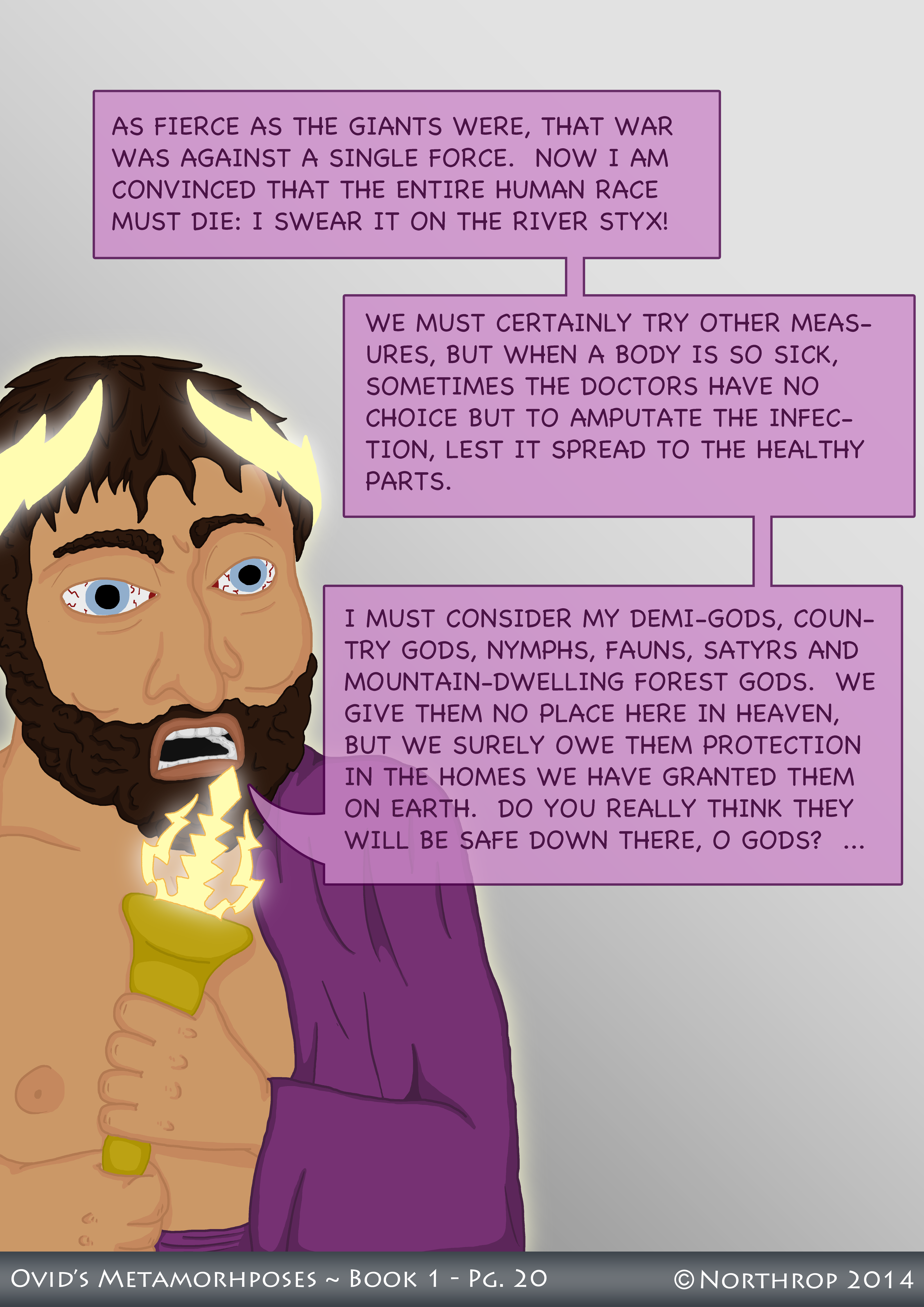Met. 1.185-196 – Jupiter’s Speech [Part 1]
“NAM QUAMQUAM FERUS HOSTIS ERAT, TAMEN ILLUD AB UNO
CORPORE ET EX UNA PENDEBAT ORIGINE BELLUM.
NUNC MIHI, QUA TOTUM NEREUS CIRCUMSONAT ORBEM,
PERDENDUM EST MORTALE GENUS; PER FLUMINA IURO
INFERA SUB TERRAS STYGIO LABENTIA LUCO.
CUNCTA PRIUS TEMPTANDA, SED IMMEDICABILE CORPUS
ENSE RECIDENDUM EST, NE PARS SINCERA TRAHATUR.
SUNT MIHI SEMIDEI, SUNT RUSTICA NUMINA NYMPHAE
FAUNIQUE SATYRIQUE ET MONTICOLAE SILVANI;
QUOS, QUONIAM CAELI NONDUM DIGNAMUR HONORE,
QUAS DEDIMUS CERTE TERRAS HABITARE SINAMUS.
AN SATIS, O SUPERI, TUTOS FORE CREDITIS ILLOS”
“AS FIERCE AN ENEMY AS THAT WAS, NEVERTHELESS THAT
WAR LOOMED FROM ONE BODY AND FROM ONE ORIGIN.
NOW TO MY MIND THE WHOLE HUMAN RACE, WHEREVER NEREUS RESOUNDS AROUND THE GLOBE,
MUST DIE; I SWEAR IT BY THE INFERNAL RIVERS THAT
FLOW BENEATH THE EARTH IN STYGIAN GLOOM.
ALL THINGS MUST BE TRIED FIRST, BUT AN UNTREATABLE [PART OF THE] BODY
MUST BE CUT BY THE KNIFE, LEST THE GOOD PART IS TAKEN DOWN WITH IT.
I HAVE MY DEMI-GODS, RUSTIC DIVINITIES, NYMPHS,
FAUNS, SATYRS AND MOUNTAIN-DWELLING FOREST GODS;
SINCE WE DO NOT DEEM THEM WORTHY OF THE HONOUR OF LIVING IN HEAVEN,
WE MUST CERTAINLY PRESERVE THE LANDS THAT WE HAVE GIVEN THEM TO LIVE IN.
IS IT ENOUGH, O GODS, TO MAKE YOU BELIEVE THEY WILL BE SAFE?”
Jupiter’s speech is a little all over the place. He’s kind of mixing metaphors as well – “this is a war, against an infection!” – not exactly sound rhetoric there. He also has a little problem with appealing to protection of the nymphs, since as Barchiesi (2008: 185) points out, the nymphs and other assorted minor deities usually suffer worse at the hands of the celestial gods than from any mortal. It’s all a bit ironic… However, that is the purpose of this speech here, really, and others like it. The speeches are bad, but bad on purpose, for irony’s sake. You’ll quickly notice that Ovid loves irony, especially when it subverts the powerful. Ovid was a skilled rhetorician; this is not only said by Seneca, but also by Ovid himself, who tells how his father pushed him to become study law and public speaking, even though he wanted to be a poet. His career didn’t work out in the courts, but his training helped him in his beloved art. Richard Tarrant, in his 1995 essay “Ovid and the Failure of Rhetoric”, argues that Ovid had a strong command of rhetoric that helped him play with speeches in his poetry. Tarrant already notes other instances in which Ovid even more emphatically makes speeches ironically bad on purpose, such as the speech of Orpheus to Dis in Book 10. A similar phenomenon is certainly seen here. The fact of the matter is that the other gods would agree with Jupiter no matter what he said; that is autocracy. By putting flaws and ironic errors in Jupiter’s speech, Ovid subtly says something not only about the council of the gods, but also the autocracy on which he has modelled his council, that is, the regime of Augustus in Rome.
Sorry for the less detailed page this week. Now that we’re in term-time, I’ve started teaching again and have to juggle that with the most important thing: getting my dissertation moving forward. It’s coming slowly at the moment, but I am hammering out literary theory problems. I’m looking forward to when I can get back to working on stories in the Metamorphoses. In the meantime, I get to explore the readings of different stories here, so luckily I’m never without the poem’s characters and adventures in my life. Next week will be a fancy page that I hope you all will love as much as I am loving making it in my evenings! See you then!

Discussion ¬